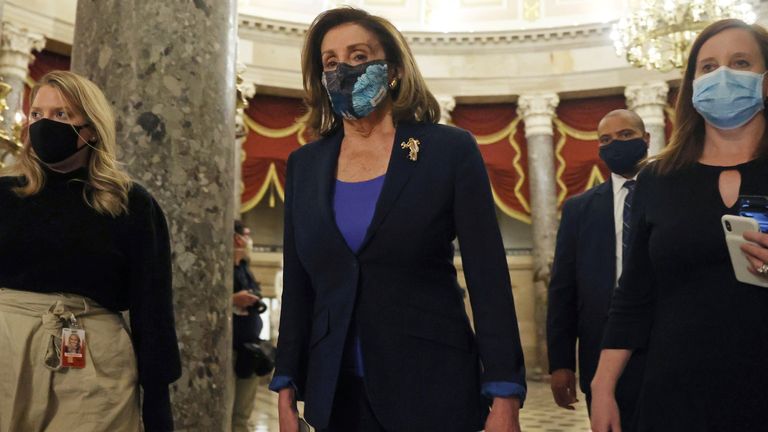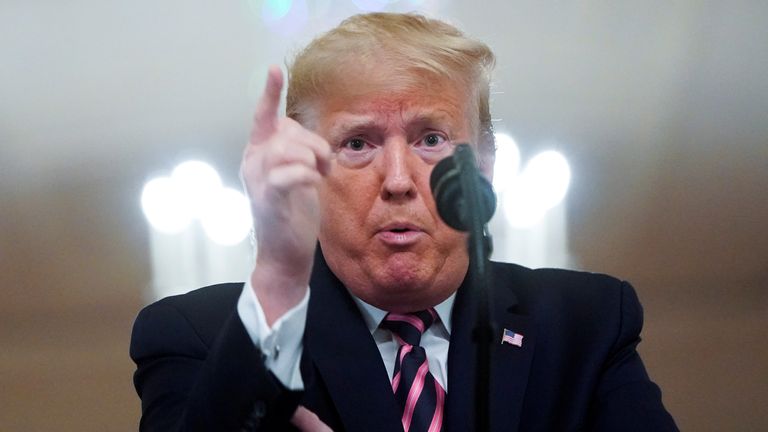Donald Trump impeached again – but what does it mean this time?
Donald Trump has become the only US president to be impeached twice.
He was first impeached by the Democratic-led House of Representatives in December 2019 on charges of abuse of power and obstruction of Congress over his dealings with Ukraine about political rival Joe Biden.
The 45th president was acquitted by the Republican-led Senate last February and remained in power. So how will this time be different?
What is impeachment?
A misconception about impeachment is that it refers to the removal of a president from office.
In fact, it refers only to the House of Representatives, the lower chamber of Congress, bringing charges that a president engaged in a “high crime or misdemeanour”.
A majority of the House’s 435 members approved bringing charges, known as “articles of impeachment”.
What “high crime and misdemeanour” is Mr Trump accused of?
House Democrats accused the 74-year-old president of inciting the “lawless action” that took place at the Capitol on 6 January.
10 Republicans joined Democrats in voting for the articles of impeachment, charging him with “incitement of insurrection”.
What happens now the House has voted to impeach?
The process will move to the Senate, the upper chamber.
A two-thirds majority of the Senate is needed to convict him, meaning at least 17 Republicans in the current make-up of the 100-member chamber would have to vote for conviction.
House Speaker Nancy Pelosi has already named nine “impeachment managers”, who would present the House’s case for impeachment during a Senate trial.
The top Senate Republican, Mitch McConnell, has said the earliest a trial could begin is 20 January – the same day as the inauguration of Mr Biden as the next president.
Mr McConnell said the chamber is in recess until then. To start earlier, all 100 Senators would need to vote in favour of doing so.
Senate Democratic Leader Chuck Schumer is exploring using emergency authority to reconvene the Senate before, but such a move would require Mr McConnell’s approval.
Impeachment experts said the Senate is free to set its own rules, and could hold a trial in a single day if it wanted to.
How is it different to the first impeachment in 2019?
While Mr Trump’s first impeachment was related to his connections with Ukraine, this time it involves a domestic attack on the Capitol in Washington DC.
He is accused of inciting thousands of his supporters to storm the seat of Congress, forcing lawmakers who were certifying Democratic President-elect Joe Biden’s election victory into hiding.
The violent assault on a symbol of American democracy which left five people dead is the first time a president has been accused of inciting violence against another branch of government.
In December 2019, the House voted to impeach Mr Trump mainly on party lines, approving a first article, abuse of power, 230-197. The second article, obstruction of Congress, was approved 229-198.
That impeachment came 85 days after the announcement of the inquiry against Mr Trump.
In the Senate trial, the president was cleared of abuse of power by 52-48 votes. He was also cleared of obstruction by 53-47 votes.
How long could the Senate trial take as part of the latest proceedings?
It is not known.
From Mr Trump’s impeachment on 19 December 2019, it took 48 days to reach his acquittal the following February.
This second impeachment might actually take longer because Mr Trump will not be in office when the trial is likely to start with Mr Biden needing some of the Senate schedule for votes on new legislation and Cabinet nominees after he becomes president.
Why have an impeachment trial if Mr Trump is just days from leaving office?
Impeachment cannot only be used to remove Mr Trump from office – but also to disqualify him from running again in the future.
Two historical precedents, both involving federal judges, make clear that only a simple majority of the Senate is needed to disqualify the president from holding office again.
And some believe that even if the Senate does not convict the president, senators could hold a second, separate vote to prevent him from holding future office.
A simple majority of the 100 members would be needed to block any future bid by Mr Trump.
But other legal experts claim the Senate could only prevent Mr Trump from holding office if it first votes to convict him in the impeachment trial.
It means Democrats, who will take control of the Senate later this month, have a realistic chance of barring Mr Trump from running for president in 2024.
It comes as some sources in Washington DC continue to claim that Mr Trump is considering running for president in 2024.
Democrat representative Ilhan Omar says the process is important to set a precedent.
She said: “What we do today will matter for the rest of this nation’s history.”
Will he keep his benefits?
When a president leaves office, they are entitled to a range of benefits at the expense of the taxpayer – including a pension thought to be about $200,000 a year, an annual $1m for travel expenses, and money for staff.
However, the 1958 Former Presidents Act states these perks are not available for anyone removed from office after being impeached.
So whether Mr Trump is convicted and removed by the Senate – even after he leaves – could have ramifications for him politically and financially.
Could he be prosecuted for his role in the US Capitol riots?
As impeachment is not a legal proceeding, there is no chance of double jeopardy – meaning Mr Trump could still be prosecuted for the same acts that saw him impeached.
Source: Read Full Article






